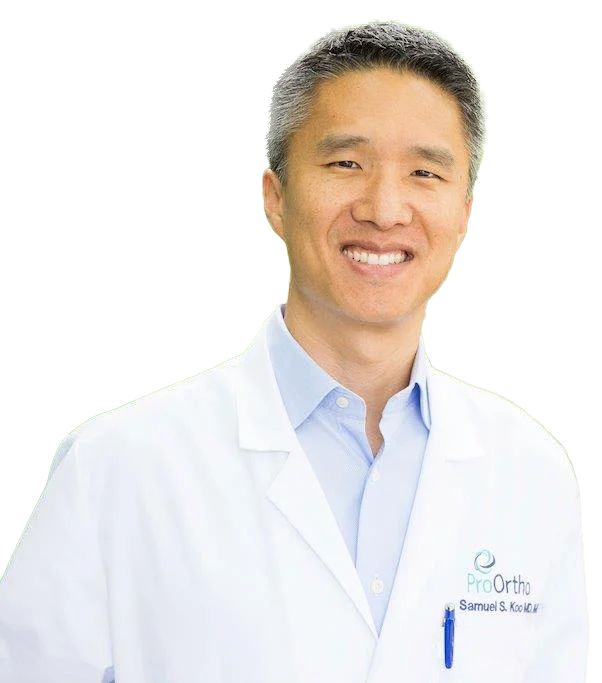Rotator Cuff Injury Treatment in Seattle, WA
Specializing in Rotator Cuff Repair to Patients Living in Kirkland, Seattle, Bellevue, and the Surrounding Area
What Is the Rotator Cuff?
The rotator cuff is an extremely important set of muscles in the shoulder. The rotator cuff is composed of four tendons that blend together into one cuff. This cuff of tendons and muscles controls the complex motions and helps maintain the stability of the shoulder. The larger muscles of the shoulder, such as the deltoid, provide strength. The rotator cuff maintains proper mechanics. The four rotator cuff muscles and their tendon cover the head of the humerus (the “ball” of the shoulder joint) forming a “cuff” over the shoulder. Acting together, they help to lift the arm and allow the joint to rotate. Dr. Samuel Koo is a specialist in the diagnosis and treatment of rotator cuff conditions in the Seattle area.
What are Common Rotator Cuff Conditions?
With an intact rotator cuff, you can throw a baseball, swim and rock climb because of the stability that the muscles impart to the shoulder. With a torn cuff, even raising the weight of the arm can cause significant pain.
Rotator cuff disease is very common and encompasses impingement syndrome, subacromial bursitis, rotator cuff tendinitis, partial rotator cuff tears. These problems are typically treated without surgery. However, when left untreated, rotator cuff tendonitis and partial tears contribute to abnormal mechanics, wear and tear on the joint, pain, and further deterioration of the rotator cuff and the labrum. The end stage of this process is a full thickness rotator cuff tear and eventual destruction of the joint (cuff arthropathy). The most commonly injured tendon is the supraspinatus followed by the infraspinatus and the subscapularis. The teres minor is rarely injured.
Rotator Cuff Tears
While rotator cuff tears can occur from a single traumatic injury like falling, most tears occur through overuse or simple degeneration. People who are most at risk are those who engage in repetitive overhead activities like baseball, weight lifting and tennis. Recent studies also indicate there may be a genetic component to rotator cuff tears. Family members of those with rotator cuff tears are more likely to have it and those with a rotator cuff tear in one shoulder are more likely to have the other side affected as well.
Rotator Cuff Tendinitis
Rotator cuff tendinitis means your tendons are inflamed, which is usually caused by a specific injury or from overuse. It also tends to develop over a long period time, from lifestyle trends such as shoulder positioning, such as sleeping on your shoulder in a specific way, or your line of work and how it affects your shoulder placement. Activities that require you to extend your arm over your head also can lead to rotator cuff tendinitis, common more in athletes and people with manual labor jobs. Tendinitis causes a dull ache or pain and general stiffness, and sometimes swelling in the front of the shoulder.
What Are the Symptoms of Rotator Cuff Disease?
People with rotator cuff tears commonly complain of pain and weakness when lifting the arm. The pain often radiates to the side of the arm. Many also report difficulty sleeping and waking up from the shoulder pain. Despite rest and use of anti-inflammatory medicine, the symptoms continue for months without resolution.
What Treatment Options Are Available?
Rotator cuff disease can sometimes be treated non-operatively with rest, anti-inflammatory medications, and physical therapy. In cases where non-operative treatment is unsuccessful, and in younger patients with rotator cuff tears, a rotator cuff repair can be performed by Dr. Koo. The goal of rotator cuff repair is to relieve pain, restore strength, improve function, and maintain the shoulder joint.
Non-Surgical Treatments
In many cases, nonoperative treatment can provide rotator cuff pain relief and improve the daily function of the shoulder. Tears are not life or limb threatening. You have a choice in deciding the treatment. Some of the commonly prescribed treatments by Dr. Koo include; rest, ice, avoidance of aggravating activity, anti-inflammatory medications, cortisone injections and physical therapy.
Looking for Rotator Cuff Surgery in Seattle, WA?
Other Useful Information
- Rotator Cuff tears do not heal by themselves. The reason is mainly mechanical. The rotator cuff is like a stretched out rubber band.
- Once the rotator cuff tendon tears from its bone bed, it retracts and the two ends are no longer in proximity to each other. As a result, they cannot heal.
- Rotator cuff tears typically get bigger over time. Recent studies indicate 50% of tears increase in size over the course of 18 months.
- Larger tears have higher retear rates and poorer functional outcomes when compared to smaller tears.
- Rotator cuff tears undergo fatty infiltration and muscle atrophy over time. Fatty infiltration is irreversible and permanently weakens the tendon.
Schedule a Rotator Cuff Repair Consultation
If you’re dealing with a rotator cuff injury in the Seattle area, contact shoulder surgeon Samuel Koo, MD, MPH today to schedule an appointment. Dr. Koo performed over 375 shoulder surgeries last year alone, so you know you’ll be in experience hands. Give us a call at (425) 823-4000 or request an appointment through our secure online form. Our office is located in Kirkland, just a short drive from Redmond, Bellevue, and Seattle.

